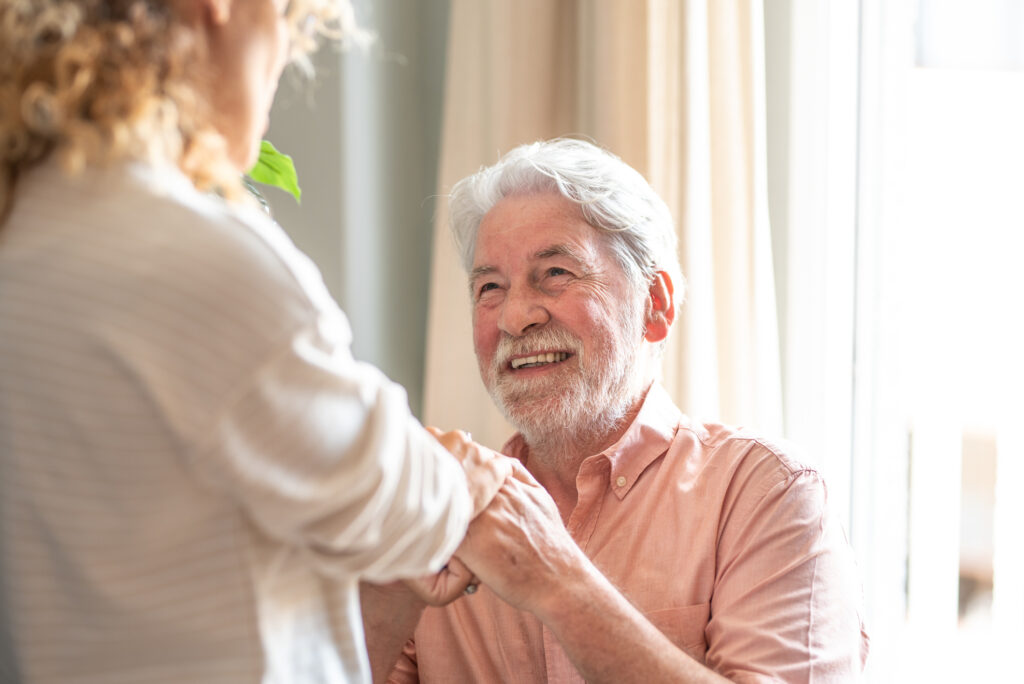Leaving the hospital with someone you love after a stroke can feel like a win—until the front door closes behind you. Suddenly, you’re back in the rhythm of home life, but everything’s different. The routine, the expectations, the roles. And, the unknowns of stroke recovery at home can feel endless.
You’re not expected to have it all figured out. But there are answers to many of the questions running through your head right now.
How long will this take?
There’s no universal timeline. Stroke recovery is a deeply personal process. Some improvements happen quickly, while others unfold slowly over time. The best thing you can do? Stop watching the clock. Instead, focus on the quiet victories—like putting on socks independently or holding a conversation without cues. Those are real signs of progress.
Can someone make a full recovery?
Many people do, but “full” doesn’t always mean a return to life exactly as it was before. Sometimes it means adjusting to new routines and abilities. Thanks to neuroplasticity, the brain can rebuild and reroute with the right support. Consistency, patience, and repetition are essential. The goal isn’t to go backward—it’s to move forward in a new way.
What does a productive day look like?
It doesn’t have to revolve around appointments. Functional tasks—buttoning a shirt, stirring a pot, sorting mail—are excellent forms of therapy. So is conversation, music, and even short walks. Blend activity with rest and be flexible. You’re not running a rehab center—you’re rebuilding life in familiar surroundings.
Is it normal to see emotional changes?
Very. Stroke can affect the brain’s emotional control centers. Mood swings, depression, frustration, or emotional outbursts are all common—and valid. If emotional shifts become persistent or overwhelming, don’t ignore them. Mental and emotional health is just as critical to recovery as physical strength.
Why do they seem different now?
A stroke can subtly or significantly alter how a person interacts with the world. They may laugh at things they didn’t before or seem disconnected from past interests. These shifts are often a combination of physical brain changes and the psychological toll of surviving a stroke. With time, support, and therapy, new patterns often emerge.
What about my own well-being?
You’re part of the recovery process, too. Exhaustion, stress, and guilt are common, but they don’t have to be constants. Caregiver burnout is a sign to step back and regroup, not a sign of failure. Accept help. Hire help. Take breaks. Your strength is important—but so is your sustainability.
What if we feel stuck?
Plateaus happen. One week might bring new words or improved movement, and the next, it might feel like nothing’s changing. That’s normal. Keep routines steady, stay in touch with care professionals, and don’t be afraid to switch things up. A fresh approach—like changing therapy times or introducing a new hobby—can restart progress.
What therapies are usually needed?
Most stroke survivors benefit from a combination of:
- Physical therapy for rebuilding movement and balance
- Occupational therapy for regaining independence in everyday tasks
- Speech therapy for communication and swallowing issues
- Cognitive therapy for problem-solving, memory, and concentration
Many of these therapies can be brought into the home, allowing recovery to happen in a comfortable, supportive environment.
What signs should we watch for in case of another stroke?
The risk of recurrence is highest in the first year. Keep the FAST acronym in mind: Face drooping, Arm weakness, Speech changes, and Time to call 911. Involve healthcare providers in creating a prevention plan that includes lifestyle changes, medication management, and regular check-ins.
Stroke recovery isn’t a checklist—it’s a journey. Some days will be harder than others, but you don’t have to face them alone.
If you could use help along the way, we’re here. At Compassionate Care Home Health Services, we provide thoughtful, expert in-home care in Alpena, Saginaw, West Branch, and throughout Northern and Central Michigan. Call us at 877.308.1212 to learn how our stroke recovery support can bring calm, comfort, and confidence back into daily life.

